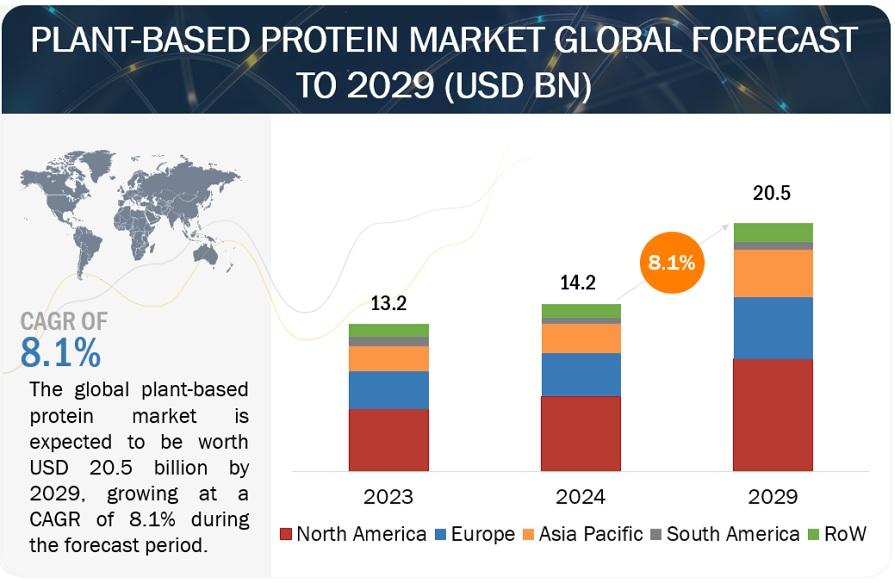The plant-based protein market is estimated at USD 14.2 billion in 2024 and is projected to reach USD 20.5 billion by 2029, at a CAGR of 8.1% from 2024 to 2029. The plant-based protein market has seen exponential growth in recent years, fueled by increasing consumer awareness of health, environmental sustainability, and ethical concerns regarding animal agriculture. This market encompasses a wide range of products derived from sources like soy, pea, wheat, rice, and other plant-based sources, providing alternatives to traditional animal-derived proteins. With the rise of flexitarian, vegetarian, and vegan diets, there has been a surge in demand for plant-based protein products across various categories, including meat substitutes, dairy alternatives, snacks, and beverages.
Request Sample Pages of Report: https://www.marketsandmarkets.com/requestsampleNew.asp?id=14715651
The North American region is estimated to dominate the plant-based protein market
The increasing desire for plant-based proteins in North America stems from various factors reflecting changing consumer tastes, heightened environmental awareness, increased health consciousness, and recognition of the benefits of plant-focused diets. Particularly, health-conscious individuals in the region are favoring plant-based proteins over animal products due to their reduced saturated fat and cholesterol levels. Additionally, rising concerns regarding the environmental repercussions of animal farming, including deforestation, greenhouse gas emissions, and water usage, have prompted consumers to see plant-based proteins as a more sustainable and environmentally friendly option.
Key Players in the Market
· ADM (US)
· Cargill Incorporated (US)
· International Flavors & Fragrances Inc. (US)
· Ingredion (US)
· Roquette Frères (France)
· Wilmar International Ltd. (Singapore)
· Glanbia plc (Ireland)
· Kerry Group PLC (Ireland)
· DSM (Netherlands)
Based on type, the isolates sub segment is estimated to grow at the fastest CAGR during the studied period
Protein isolates represent a refined form of protein powder distinguished by its remarkable purity and exceptionally high protein content, typically averaging around 90%. Despite their higher cost compared to other plant-based protein options, plant protein isolates are preferred for their outstanding digestibility and adaptability across various food products. Typically derived from legume sources such as soy and pea de-oiled cake, they are widely regarded as one of the safest protein sources, suitable even for infant nutrition. The plant-based protein market anticipates significant growth prospects for isolates owing to their concentrated protein content, rendering them highly suitable for incorporation into nutritional and functional foods like snacks, cereals, beverages, and plant-based meat substitutes. Pea protein isolates, in particular, have emerged as a valuable protein source, responding to the nutritional industry's increasing demand for high-protein offerings.
Make an Inquiry: https://www.marketsandmarkets.com/Enquiry_Before_BuyingNew.asp?id=14715651
The feed application in the plant-based protein market is forecasted to register the most significant CAGR over the projected period
The demand for plant-based proteins in animal feed is steadily increasing, reflecting the rise in consumption of various products in developed countries. North America and Asia Pacific play significant roles in both meat production and feed consumption. Although plant-based sources have been used in the food industry for some time, they have typically been processed and utilized in a relatively basic protein form. However, there is a noticeable trend towards the development of higher-quality protein-based feeds, such as isolates, indicating an enhancement in feed quality. Pea protein isolates, particularly favored in aquafeed, and potato proteins, widely used in compound premixes to improve overall yields, are gaining popularity. This shift towards plant-based proteins in feed applications is driven by growing concerns about sustainable agricultural practices, aiming to mitigate the environmental impact of future food production.



